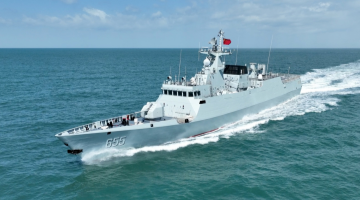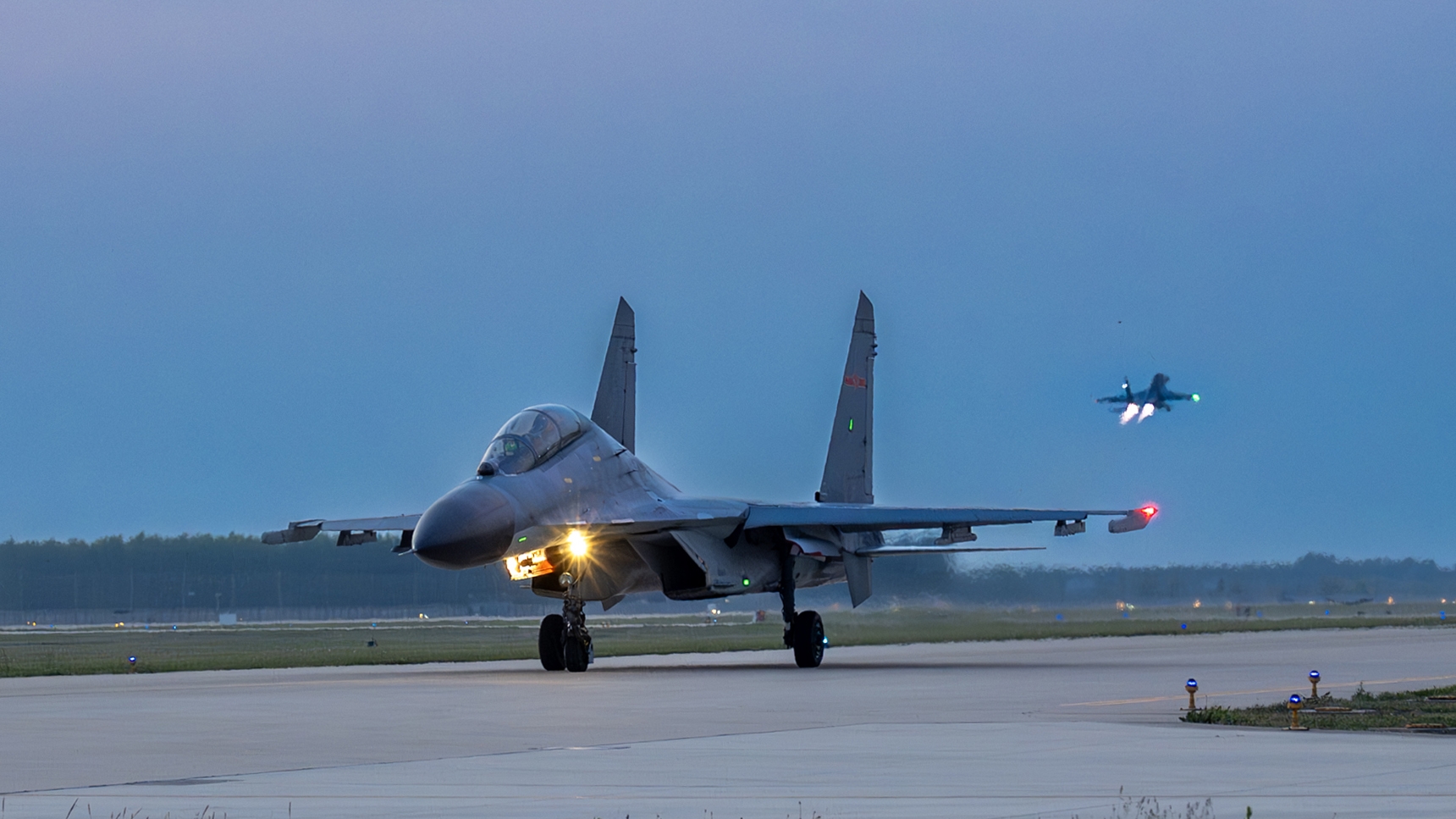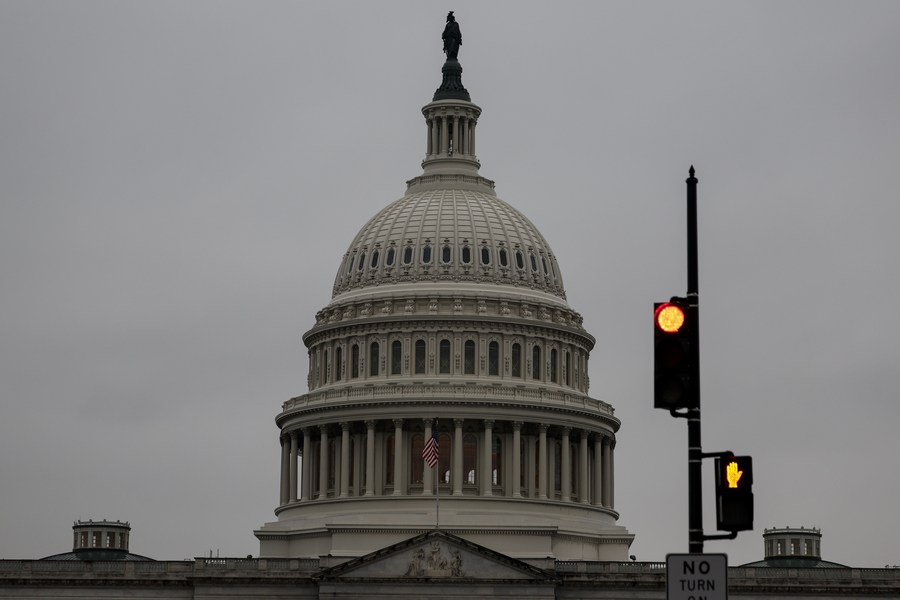
Photo taken on Jan. 19, 2023 shows the U.S. Capitol building in Washington, D.C., the United States. (Photo by Ting Shen/Xinhua)
In the wake of the Second World War, it has been widely acknowledged that there is only one international order, i.e. the international order underpinned by international law; and there is only one set of rules, i.e. the basic norms governing international relations underpinned by the purposes and principles of the UN Charter. And in these historic treaties or documents there is no mention of the so-called "rules-based" order.
While the United States cannot stop stressing the urgency to maintain the "rules-based" world order, they are accusing countries like China and Russia of posing a challenge to it. Increasingly, the term has been weaponized to suppress nations they deem a "threat" to their pursuit of global hegemony.
by Xinhua writer Wang Xinyi
BEIJING, May 8 (Xinhua) -- In recent years, U.S. President Joe Biden and many senior U.S. officials have begun to repeatedly invoke "the rules-based world order" in press briefings, bilateral talks or international gatherings, emphasizing the urgency and the necessity to maintain it.
However, that phrase still remains a myth as decision-makers in Washington have never bothered to specify what exactly these rules are or who set them. Or perhaps they simply want to keep it that way.
INTENTIONAL AMBIGUITY
In the wake of the Second World War, it has been widely acknowledged that there is only one international order, i.e. the international order underpinned by international law; and there is only one set of rules, i.e. the basic norms governing international relations underpinned by the purposes and principles of the UN Charter. And in these historic treaties or documents there is no mention of the so-called "rules-based" order.
The blurry term is not a new invention by the current U.S. administration. In his survey based on Google Ngram search, Paul Poast, associate professor in the Department of Political Science at the University of Chicago, found that the phrase began appearing in texts in the late 1980s, and its usage took off starting in the early-to-mid 2000s, which was partially in response to the 2003 invasion of Iraq, particularly since the war was done without UN authorization.
The Iraq war is a classic example demonstrating why the United States has invented such a catchphrase -- trying to confuse the world community and get rid of the constraints of international law.
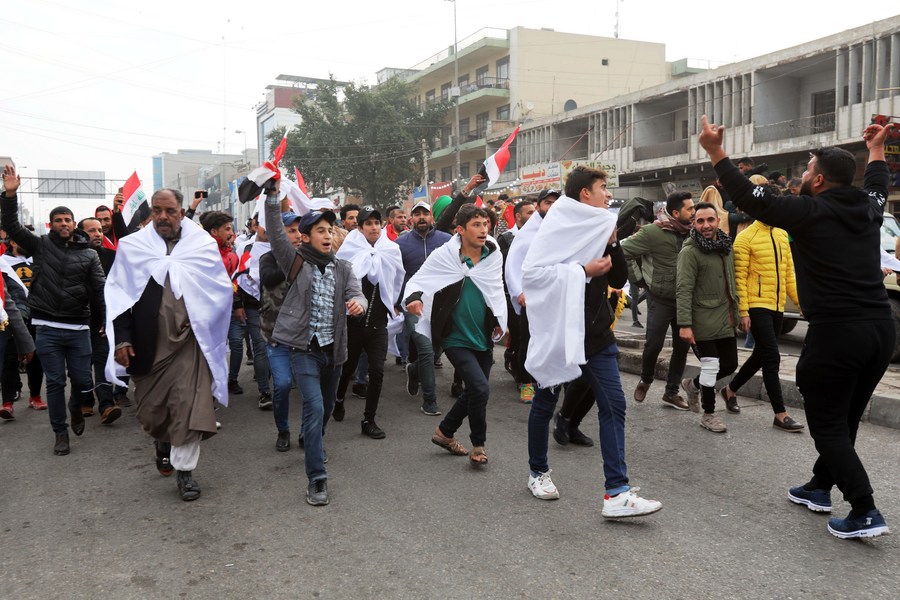
Iraqi protesters take part in a demonstration against the presence of U.S. troops in the country, in Baghdad, capital of Iraq, Jan. 24, 2020. (Xinhua/Khalil Dawood)
In fact, the U.S. government has a tradition of putting its domestic law above international law and selectively applies international rules as it sees fit. For example, Washington has enacted such domestic laws as the International Emergency Economic Powers Act, the Global Magnitsky Human Rights Accountability Act and the Countering America's Adversaries Through Sanctions Act to target and sanction specific countries, entities or individuals.
The ambiguous rules contained in these acts and executive orders, such as the "minimum contacts" rule and the "effects doctrine," are a willful expansion of the jurisdiction of America's domestic laws.
And for more than six decades, despite dozens of UN General Assembly resolutions, the United States has pressed ahead with its comprehensive blockade against Cuba, the longest and cruelest systemic trade embargo and financial sanctions in modern history, based on its embargo policies and domestic laws such as the Torricelli Act and the Helms-Burton Act. The blockade has led to over 100 billion U.S. dollars of direct losses to Cuba's economy.
"The RBO (rules-based order) is something other than international law. It is an alternative regime outside the discipline of international law which inevitably challenges and threatens international law," John Dugard, an international law professor at the Netherlands-based Leiden University, wrote in an editorial.
Alexander Gusev, director of Russia's Institute for Strategic Planning and Forecasting, argued that the United States deliberately keeps the definition of the "rules-based international order" vague, because the less specific the so-called "rules," the more it can manipulate them at will.
MY WAY OR THE HIGHWAY
While the United States cannot stop stressing the urgency to maintain the "rules-based" world order, they are accusing countries like China and Russia of posing a challenge to it. Increasingly, the term has been weaponized to suppress nations they deem a "threat" to their pursuit of global hegemony.
High-tech is a major arena where the United States is fighting tooth and nail to maintain dominance. Viewing China as a strategic competitor, the U.S. government has sought to limit Chinese access to critical Western technologies.
Under the pretext of "national security," the Biden administration has blacklisted more Chinese tech firms, imposed broad new limits on selling advanced chip technologies to Chinese firms and is coercing many of its treaty allies into following suit.
And to encircle China in the Asia Pacific, or in the words of U.S. Secretary of State Antony Blinken, to "shape the strategic environment around Beijing," Washington claims it is defending the "rules-based" international order by building up such alliances as the AUKUS and Quad groupings, forcing regional countries to pick sides and putting regional peace and security on the line.
In the words of Stephen M. Walt, a professor of international relations at Harvard University, the United States is always ready to "ignore, evade, or rewrite the rules whenever they seem inconvenient."
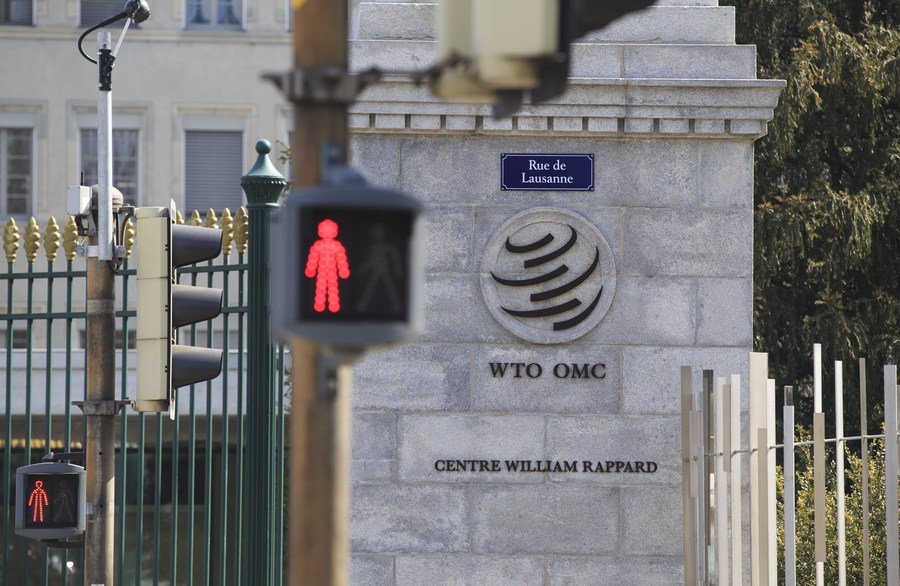
Photo taken on April 2, 2019 shows the WTO logo on the main gate of the World Trade Organization (WTO) in Geneva, Switzerland. (Xinhua/Xu Jinquan)
Take global trade. Official data showed that the United States is responsible for two-thirds of violations of WTO rules in global trade. With Washington frequently losing its WTO cases, the country has tried to subvert the trade organization's dispute settlement mechanism by blocking the appointment of new judges.
Former U.S. President Barack Obama directly expressed America's entitlement to rulemaking. "We have to make sure America writes the rules of the global economy. We should do it today while our economy is in the position of global strength," Obama called out back in 2015.
AN UNSTOPPABLE SHIFT
The world is now experiencing an epic and inevitable shift to multipolarity. The rise of many of the world's emerging economies is seen by many as the relative decline of the West.
Wang Honggang, director of the China Institutes of Contemporary International Relations Institute of American Studies, argued that when hegemons are in decline, they start to stress rules.
With the collective rise of non-Western countries and the constant evolution of the international situation, the United States and its Western partners are trying to slow down the trajectory toward a multipolar world by highlighting ambiguous rules, Wang added.
According to Washington's colonialist vision for the world, the West, particularly the United States, should monopolize the low-cost, high-tech and high-value-added industries. In contrast, the rest of the world on the periphery is relegated to making a living on less sophisticated and low-value-added jobs like low-end manufacturing.
Technically, "every 'order' by definition is 'rules-based' because if there are no rules, the consequence is anarchy, not order," Bilahari Kausikan, former Permanent Secretary of Singapore's Foreign Ministry and chair of the National University of Singapore's Middle East Institute, has argued.
However, in the multipolar world, rules should not be made by simply flexing strong muscles or waving a big fist, and a U.S.-centric order is certainly not going to be accepted.
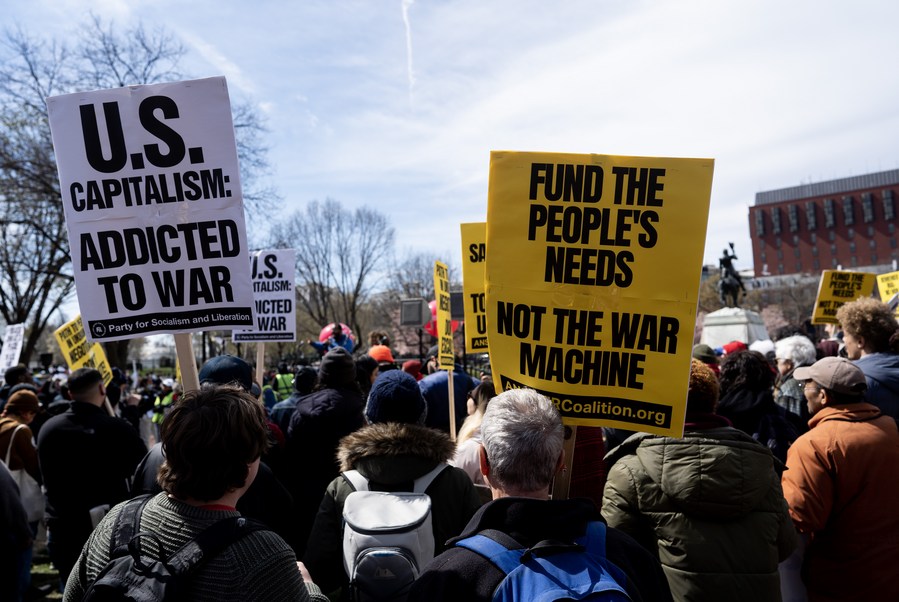
Protesters gather during the anti-war demonstration in Washington, D.C., the United States, March 18, 2023. Hundreds of protesters gathered outside the White House in Washington, D.C. on Saturday afternoon to demand a stop to endless U.S. wars and the "War Machine," two days before the 20th anniversary of the U.S.-led invasion of Iraq.(Xinhua/Liu Jie)
"The new order, reflecting a more multipolar and multicivilizational distribution of power, will not be built by Washington for Washington; it will not simply be a reflection of American values and interests," Andrew Latham, professor of international relations and political theory at Macalester College in Minnesota, commented on The Hill.
Instead, the new order to emerge in the coming years will likely reflect the national visions of different new poles. These poles will demand a say in what the new rules, norms and institutions of global governance will look like, Latham suggested.
"An international order founded on the UN Charter and international law as it has evolved since the end of the Second World War is a sounder recipe for peace than the amorphous and discriminatory rules-based international order," Dugard, the Leiden University professor, commented.
Navigating this new multipolar system will be daunting, Daniel Araya, a senior fellow with the Canada-based think tank Center for International Governance Innovation, wrote in an opinion piece. "The growing weight of emerging economies now requires proper representation."







